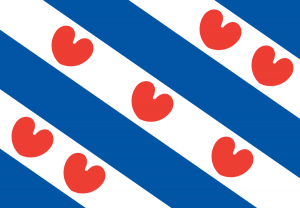Language/Western-frisian/Vocabulary/Health
Hi Western Frisian learners! 😊
In this lesson, you will learn about Western Frisian vocabulary related to health. This is an intermediate level lesson, so make sure to review the previous vocabulary lessons before starting this one. Don't forget that you can always find native speakers and ask them any questions through Polyglot Club. Keep in mind that understanding health-related vocabulary is important in this day and age, so let's get started! 😷
Basic health vocabulary[edit | edit source]
Before diving into more specific health topics, let's start with some basic vocabulary that you might hear at a doctor's appointment. Practice these words with a friend or repeat them out loud to help with memorization.
| Western Frisian | Pronunciation | English |
|---|---|---|
| stoelgang | /stuːɫxaŋ/ | bowel movement |
| pijn | /pɛin/ | pain |
| hoesten | /huːstən/ | cough |
| koorts | /koːrts/ | fever |
| misselijk | /mɪsəlɪk/ | nauseous |
| pijnlijk | /pɛinlək/ | painful |
| bloeden | /bloːdən/ | bleed |
| vermoeidheid | /vɛrˈmuːdiχɛit/ | tiredness |
Here's a dialogue to help you contextualize some of these basic vocabulary words:
- Person 1: Ik heb veel pijn. (/ɪk hɛb feiɫ pɛin/) (I have a lot of pain.)
- Person 2: Waar doet het pijn? (/wa:r dut ət pɛin/) (Where does it hurt?)
- Person 1: Het doet pijn aan mijn rug. (/ət dʊt pɛin an main rʏx/) (It hurts in my back.)
Parts of the body[edit | edit source]
Knowing the parts of the body is vital when talking about health. Use this table to learn a few of them.
| Western Frisian | Pronunciation | English |
|---|---|---|
| rêch | /reːx/ | back |
| neus | /nøːs/ | nose |
| ear | /ɛːr/ | ear |
| holle | /hɔlə/ | head |
| hert | hert | heart |
| lever | /leːvər/ | liver |
| maach | /maːx/ | stomach |
| skelet | /skɛlɛt/ | skeleton |
| hûd | /hʏt/ | skin |
To use these words in context, here's a dialogue:
- Person 1: Mijn neus is verstopt. (/main nøːs ɪs vɛrstɔpt/) (My nose is congested.)
- Person 2: Hier, neem wat tissue. (/hir, neːm vat tɪsu/) (Here, take some tissue.)
- Person 1: Bedankt. Mijn holle doet pijn. (/bəˈdɑŋt/. main hɔlə dʊt pɛin/) (Thanks. My head hurts.)
Diet and exercise[edit | edit source]
A healthy diet and exercise are generally recommended for maintaining good health. Use this table to learn some vocabulary related to diet and exercise.
| Western Frisian | Pronunciation | English |
|---|---|---|
| slaap | /sla:p/ | sleep |
| fruit | /frœy̯t/ | fruit |
| groente | /ɣrʊn.tə/ | vegetable |
| spoarjen | /spɔrjən/ | exercise |
| drinkwetter | /drɪnkˈʋɛtər/ | drinking water |
Here's a dialogue to help you contextualize these words:
- Person 1: Ik ben moe. Ik heb gisteren niet genoeg geslapen. (/ɪk bən mu.i:/. ɪk hɛb ɣɪstərə(n) nɪt xəˈnoːχ sxlaːpə(n)/) (I'm tired. I didn't get enough sleep last night.)
- Person 2: Je moet meer fruit en groente eten en meer water drinken. (/jə mœt meːr frœyt ɛn ɣrʊn.tə etən ɛn meːr ˈʋɑːtər drɪnkən/) (You should eat more fruits and vegetables and drink more water.)
- Person 1: En ik moet meer bewegen. (/ɛn ɪk mœt meːr ˈbeːʋə(n)/) (And I need to exercise more.)
Illnesses[edit | edit source]
Unfortunately, getting sick is a part of life. Use this table to learn some vocabulary related to illnesses that you might encounter.
| Western Frisian | Pronunciation | English |
|---|---|---|
| griep | /grip/ | flu |
| verkâlden | /vərkɔldə(n)/ | cold |
| tubykuloaze | /ty.be.ku.ˈlɔː.zə/ | tuberculosis |
| diabetes | /diə.be.ˈtɛːz/ | diabetes |
| kanker | /ˈkɑŋ.kər/ | cancer |
| astma | /ˈæst.mə/ | asthma |
Here's a dialogue to help you contextualize these words:
- Person 1: Ik voel me niet goed. (/ɪk vœl meː nɪt ɣut/) (I don't feel well.)
- Person 2: Heb je griep of verkoudheid? (/hɛb jə grip ɔf vərˈkɔːldɛit/) (Do you have the flu or a cold?)
- Person 1: Ik weet het niet zeker. (/ɪk wet hət nɪt ze:xər/) (I'm not sure.)
- Person 2: Misschien moet je naar de dokter gaan. (/mɪsˈsxin mœt jə naar də ˈdɔktər xan/) (Maybe you should go to the doctor.)
Conclusion[edit | edit source]
Congratulations, you've made it through this Western Frisian vocabulary lesson on health! We hope you've found this lesson informative and useful. Remember, understanding the vocabulary related to health can be vital in many situations, so don't hesitate to practice what you've learned here with a friend or a language partner. Keep learning with Polyglot Club and don't forget to review previous vocabulary lessons.
➡ If you have any questions, please ask them in the comments section below.
➡ Feel free to edit this wiki page if you think it can be improved. 😎
Well done on mastering this lesson! Don't miss these related pages to expand your knowledge: Geography & Education.

